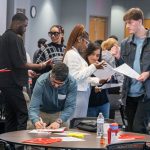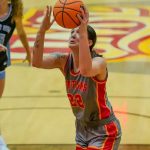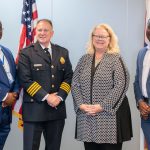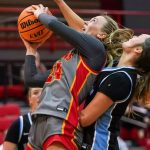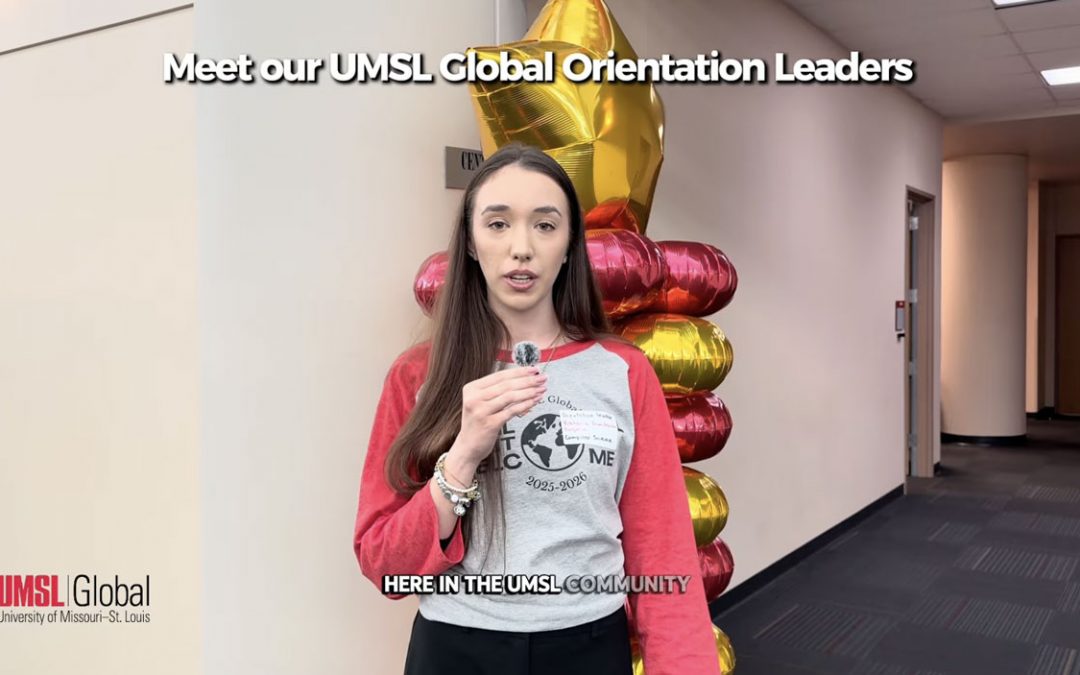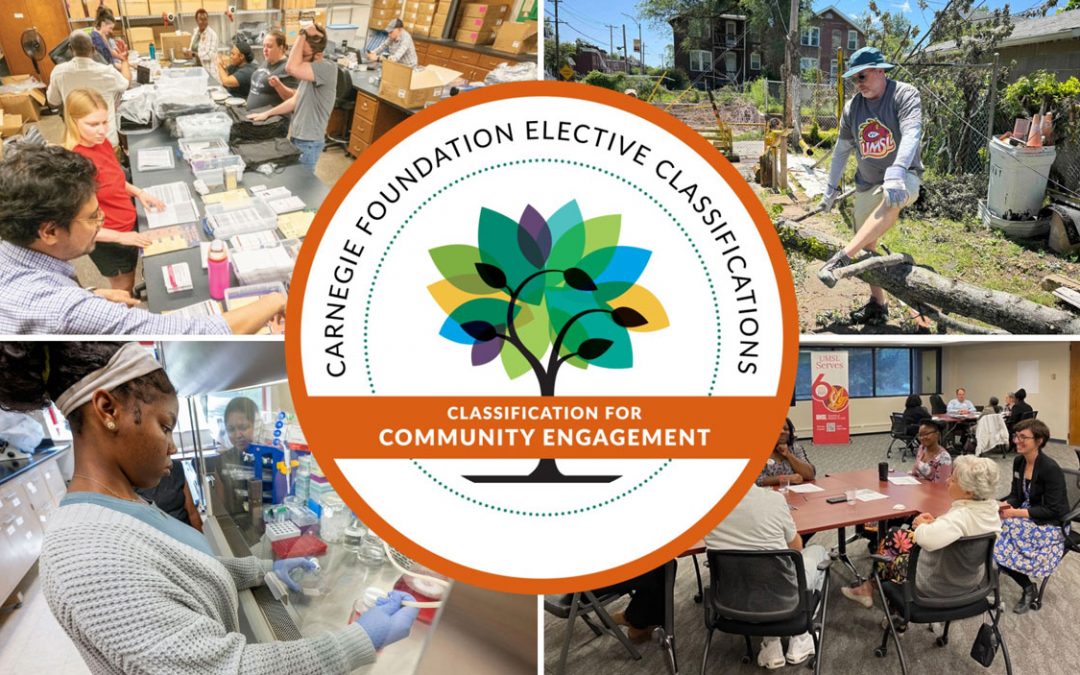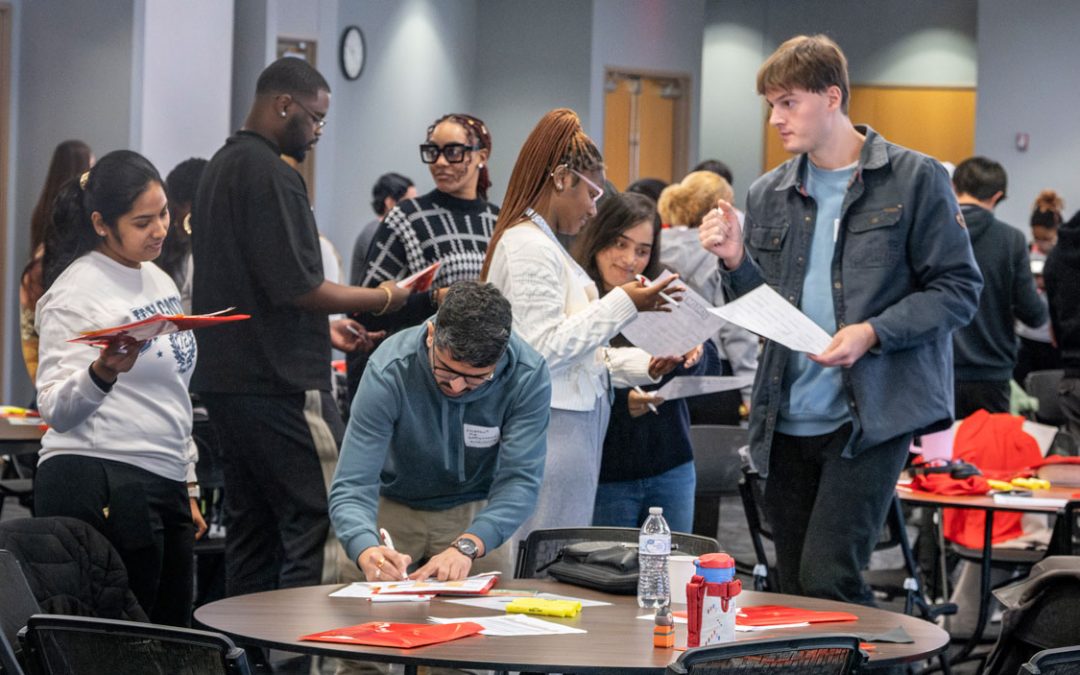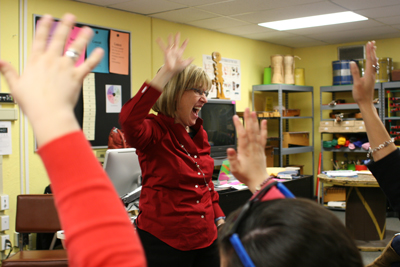
UMSL lecturer Gail Fleming punches the air along with her students as they follow the dynamics of a song. (Photo by Myra Lopez)
The speakers are blasting Beethoven, hands are punching the air and sweat is starting to form on brows. This is what learning looks like in Gail Fleming’s music class.
“Pretend you’re in sixth, seventh and eighth grade,” Fleming, a lecturer in music at the University of Missouri–St. Louis, instructs her students, all future elementary school teachers. The class – Music 3770: Integrating Music into Elementary Education – is for non-music majors. The goal is to teach future teachers how to integrate music into elementary school education. Fleming began teaching the course last summer.
On this day, she is preparing her class for a field trip to hear the orchestra at Powell Hall in St. Louis, which provides youth concerts for Metro East elementary and high school students on a regular basis. It’s a trip these future teachers may make with their class one day.
“Since my university students are planning to teach elementary school, I try to provide resources in the area for them and for their students,” Fleming said. “Each semester, I teach a lesson on: the symphony orchestra, families of instruments, sounds of instruments and how to behave at a symphony concert.”
Students who attend the youth concert are awarded extra credit. Fleming said the students generally like the pre-symphony concert lesson. And for some of them, the trip to Powell Hall is their first time at a symphony.
“If you are the orchestra and I stand here like this and go (tapping her wand), who am I,” Fleming asks her class, as if speaking to a group of youngsters. A conductor responds one student. “Good remembering,” answers Fleming, all full of encouragement.
At the beginning of the class that day each student received a card with a letter – S for Strings, B for Brass, W for Wood Winds and P for Percussion. Each letter represents the family of instruments in the orchestra.
“When you see or hear your family of instrument I want you to hold up your card,” Fleming said.
The classroom is then flooded with the sounds of Fidelio by German composer Ludwig van Beethoven. It was the only opera he wrote. Fleming joins her students in thrusting her cards in the air trying to match the card to the family of instrument playing.
“My arms hurt,” said one student after taking part in the high energy game.
“I know I’m sweating,” Fleming added.
“I try to keep the classes as high energy as possible,” she said. “I love music, and I love to teach! Teaching music is my passion!”
Her enthusiasm clearly rubs off on her students.
“She is an effective teacher that leads by example,” said Pete Scuzzo, a senior in early childhood education. “She gives us many great learning opportunities and ideas that we will be able to use in our future teaching careers.”
Fleming tells the class that if they want to replicate the lesson with their students they could vary it by having the children listen for the loud and soft parts.
“You might have your students either have cards or wave their hands,” she advised.
Fleming hopes her students take away from her class that music really has the power to teach just about anything and everything in an interesting and artistic way.
“Hopefully, they will use at least one of the lessons supplied in this class with their own students in the future and the class will assist them in creating their own lessons incorporating music and the arts.”
During her class, Fleming often takes to her piano to illustrate a piece of music or particular work that she’s talking about. Fleming wrapped up that day’s class by presenting a video of the first movement of Beethoven’s Fifth symphony. This time, students were asked to follow the dynamics and raise their hands when the music got loud and lower them when it got soft.
“This gets you ready to go to the symphony because you have heard almost everything on the program,” Fleming said.
Growing up she said she absolutely loved music and always dreamed of one day playing in the symphony orchestra. Instead of playing teacher, doctor or house like some girls she would play conductor.
“I would stand on my bed and conduct,” Fleming said. “I’d play an orchestra, and I would be conducting.”
She said the class to her is a fun time and she absolutely loves teaching future teachers.
“I hope to pass on a little of what I’ve learned teaching for the past 33 years,” she said. “My job is great – it’s like giving back to the next generation and so on and so on.”





